- Home
- Gerald Hammond
Give a Dog a Name (Three Oaks Book 4)
Give a Dog a Name (Three Oaks Book 4) Read online
GIVE A DOG A NAME
Gerald Hammond
© Gerald Hammond 1992
Gerald Hammond has asserted his rights under the Copyright, Design and Patents Act, 1988, to be identified as the author of this work.
First published in 1992 by Macmillan London Limited.
This edition published in 2019 by Endeavour Media Ltd.
Table of Contents
Chapter One
Chapter Two
Chapter Three
Chapter Four
Chapter Five
Chapter Six
Chapter Seven
Chapter Eight
Chapter Nine
Chapter Ten
Chapter One
I was along as the driver of the battered old estate car and so had stayed carefully just on the right side of the breathalyser but, when we got back to Three Oaks, Isobel, one of my partners, was undeniably tipsy. Only Lucy was truly sober. Nobody had offered her a drink of anything more stimulating than water although her efforts had been the cause of Isobel’s celebration.
Lucy was a black and white springer bitch of our own breeding. We had intended to keep her as a brood bitch, but an early case of pyometra had necessitated a hysterectomy and put an end to that plan. The alternative was to sell her as a trained gun dog; but she had responded so well in advanced training that we had decided to run her in a trial or two. A spayed bitch might not be everyone’s choice as a shooting companion, but a spaniel that was not only trained but had shown a few successes in field trials would have substantially enhanced value in the market-place.
In age, Isobel was the senior partner by some years. Anyone judging by appearance alone would have guessed her to be a fountain of good works and fancy knitwear, destined to become a formidable old lady. But Isobel had started life as a vet and had remained in touch with gun dogs during her long marriage. She had proven to be a winning handler. She might be short of the patience needed for training dog after dog, varying the regime to suit the personality of each pupil; but that was my forte. Instead, she had the ability to stay calm under the stress of competition conditions. When the bird was a runner, the spaniel getting out of control and the nearest judge beginning to look suspicious, Isobel would be thinking her way through circumstances which would reduce many handlers, myself included, to a state of impotent whistling. She also had the gift of robust good health which I lacked. Thanks to Isobel’s firmness and her apparently intuitive knowledge of which way a pricked pheasant was going to run, Lucy had won an open stake at only her second attempt.
There had been fog on the Cairn o’ Mount and a tailback at the Tay Road Bridge. It was late when my headlamps swept across the face of the converted farmhouse and woke the dogs in their wired-in kennels. They knew the sound of the car, but any excuse to bark was a break in the monotony of the long night. I noticed an unfamiliar car, unostentatiously expensive, tucked against the end of the barn.
The outside lamp came on and then more light fanned out as Beth, my wife and the third partner in the kennels, came out. Even in the harsh light of the headlamps she looked like a teenager. She was at my window as I brought the car to a halt. ‘There’s somebody waiting,’ she said.
This had to be urgent or she would first have asked how we had fared and whether Lucy was undamaged by barbed wire and stray pellets. ‘I’ll come right away,’ I said.
Beth stooped to speak past me. ‘It’s Isobel he wants to see.’
‘You and Isobel should be putting Lucy away,’ I said firmly. Isobel was not going to meet any clients that evening. ‘Lucy’s been dried. She’s had her meal and we let her out for a pee when we filled the car up at Stracathro.’
Beth looked at Isobel and nodded quickly. She was no stranger to Isobel’s habit of going on the toot whenever there was an excuse for a celebration. ‘Stardust refused again,’ she said.
I sighed. The statement would have sounded mad to a stranger but I knew exactly what Beth meant. Stardust was another of our breeding prospects, but during her previous season, rather than accept the service of either of the chosen studs she had not only refused to stand but had made spirited attempts to castrate each of them. Her seasons were slightly irregular but she had seemed to be arriving at the most propitious time.
The drizzle which had plagued us all day in Aberdeenshire had given way to frost in Fife. Ice had been jangling under the wheels for the last few miles. ‘Take my coat,’ I said, ‘or you’ll freeze.’
I gave Beth my coat and bolted into the house before the cold could seep right through me. I was met by warmth and the smell of cooking. Isobel and I had stopped for a snack with our drinks at Fettercairn, but Beth always goes on the assumption that I have eaten nothing since leaving home.
In our old-fashioned sitting-room, a cheerful fire was burning. A cup of tea, still full, had cooled beside one of the wing-chairs but the visitor was on his feet. As with his car, his clothes managed to be both expensive and at the same time modest. He was in his forties although premature baldness made him look older, but his movements were brisk and animated. I put him down as a businessman, usually very calm and assured but for the moment very much off-balance. I get these moments of insight from time to time and sometimes they turn out to be correct.
He came straight to the point, speaking in staccato bursts with an accent that was either English or from one of the top Scottish schools.
‘Lansdyke,’ he said. ‘Arthur Lansdyke. I live at Kilcolm, just this side of Cupar. Thank God you’ve turned up at last! Hope you can help me out.’
‘We will if we can,’ I said.
‘Thanks. You certainly can.’ He looked at his watch. ‘I’ve got about ten minutes, then I’ll have to go or I’ll miss my plane. All hell’s broken loose on a contract in Switzerland. I’ve got to be there by morning and God knows when I’ll be able to get home – could be a day or a fortnight. My dog, Horace, went AWOL during the morning. He does that sometimes, he’s an occasional wanderer, and I took my eye off him for a few seconds. Around four, just when I was ready to leave, he dragged himself home with shot in him. I have an arrangement with a local kennels, but they didn’t want the responsibility of taking him to the vet and when I managed to reach my usual vet he was unhelpful; he’d treat the dog but he wouldn’t keep him overnight and deliver him to the kennels when he’d finished doing whatever was necessary. He gave him a pain-killer and the poor old chap’s comatose at the moment, but that’s as far as the vet was prepared to go before tomorrow.
‘Then I remembered that you have kennels and one of the partners is a vet, am I right?’
‘Quite true,’ I said.
‘So I came straight here. Could you do whatever’s needed and then keep him until I get back? Carteblanche.’
I thought about it. His genuine concern over his dog was very much in his favour. ‘We don’t usually board,’ I said, ‘but we’re not expecting our usual quota of litters so I suppose we could find room. What sort of dog, and how bad is it?’
‘Springer. Great gun dog and a pedigree as long as a punt-gun. I . . . I don’t know how bad it is. I heard him wailing – a sound like nothing I’ve heard before, it sent shivers up my back! When I went out to him, his wounds were weeping.’
‘Anything other than blood?’
‘Not that I could see. He was having difficulty dragging himself along.’ Mr Lansdyke passed a shaking hand across a face which looked grey. ‘I don’t know what the hell can have happened. He never chases sheep.’
I made a noncommittal noise. Every owner says the same. Some even invent elaborate lies to hide the fact that they peppered the dog themselves in a moment of carelessness.
H
e sensed my doubt. ‘It’s true,’ he said. ‘I had him trained that way and I’ve kept it up. He thinks sheep are all in the mind. He’s a randy bugger, though. Probably went after somebody’s bitch. But shooting would seem a bit drastic even in defence of a favourite daughter.’ He looked at his watch again. ‘Got to go in a minute.’
‘Inoculation certificates?’ I asked. His hurried style of speech was infectious.
‘Here. He’s had all his shots.’ Mr Lansdyke pulled out a wad of papers and picked out a vet’s record card from between his passport and an airway ticket folder. He followed it with several bank-notes. ‘And a deposit. All right?’
‘I suppose. Where’s the dog now?’
‘Your kennel-maid carried him through to the surgery.’
‘My partner will be here shortly and she’ll see to him. You know, you could have left him with Beth and gone for your plane.’
He nodded while shrugging his way into a good sheepskin coat. ‘Seemed a bit young to be left in charge of a wounded dog.’
Beth’s absurdly juvenile appearance often gives rise to that misapprehension. ‘She’s nearly thirty,’ I said. But he was already on his way out to his car.
*
At the back of the house a small outbuilding had been tiled and converted into a miniature surgery. The intention had been to make a place where Isobel could attend to the needs of our dogs in conditions of relative sterility; but the nearest vet, who wanted to retire but did not have the heart to turn away a sick animal, had adopted a rude and unsympathetic manner which was causing many of his former clients to turn to Isobel in emergencies. As a result, the surgery had expanded in equipment and facilities while the cost had been offset by the fees that she brought in.
The patient, Horace, was indeed comatose. I found him lying flat out on the stainless steel operating table which took up about half the floorspace in the tiny room. Beth had left a bowl of water within his reach but he was snoring gently, untroubled by the dozen or more pellet-holes, some of which were still oozing a little blood. None looked dangerous to my inexpert eye, but one or two were perilously near to joints and it was quite possible that stomach contents were leaking into the body cavity. The pattern of punctures was uneven, but I guessed that the dog had been fired at from not less than thirty yards or else that the shot had been scattered by intervening leaves. In either eventuality, most of the pellets should not have penetrated too deeply. A spaniel’s thick pelt, especially the thicker coat of winter, is at least a partial protection against shot.
My partners joined me soon after Mr Lansdyke’s car was out of sight. Beth had told Isobel what little she knew and I filled in the details.
Isobel squinted at the patient. ‘Hot water,’ she said.
‘We have a new steriliser,’ Beth reminded her.
‘Not for the instruments. Black coffee,’ Isobel said. ‘And I’d better eat something. Another half-hour won’t hurt him.’
‘Come along,’ Beth said. She led the older woman through to the cluttered, shining kitchen, the heart of the house, and settled her in one of the basket chairs in front of the range. I followed and took the other chair. Beth loaded two soup-plates with a meat and vegetable stew which we took on our knees. My fickle appetite was returning and I managed to pick away at the stew, but Isobel ate with dedication.
Beth put mugs of coffee beside us. ‘Do you want me to sterilise some forceps and shave around the pellet-wounds?’ she asked.
‘Forceps, yes. The smallest we’ve got. Don’t shave him yet,’ Isobel said. ‘That only makes it more difficult to pick out any hairs that’ve been carried into a pellet-wound. And you’d end up stripping the whole dog. If he wakes up naked among strangers, the shock’d be worse than being shot.’
‘Some of the shot may have gone deep,’ I said.
‘Probing often does more damage than leaving a pellet or two under the skin. We’ll have to pick out as much as is easily reached and give him a powerful antibiotic. Somebody phone Henry and tell him to come for me in about an hour.’ Henry was her husband.
I reached for the kitchen extension.
‘If Henry’s also had a few,’ Beth said, ‘tell him to stay where he is. I’ll run Isobel home. I’ll go and get everything ready in the surgery.’
Henry, when he answered the phone, seemed quite sober. I explained that we had a minor emergency and he promised to come over as soon as he had had something to eat.
‘Eat but don’t drink,’ I said. Henry, although well on in years, was another who liked his drink on occasions. Sometimes I looked on him as a substitute father; at others, when the drink had been flowing, I treated him more as a slightly retarded son.
Isobel finished her stew and drank her coffee. She studied her fingers at arms’ length, more, I think, to test her eyesight than the steadiness of her hands. ‘Ready now,’ she said. ‘You can come and hold his head, John. I don’t want to give him any more dope if I don’t have to.’
Peppered dogs were not uncommon during the shooting season. Beth had prepared Horace meticulously. Knowing Isobel’s methods of old, she was ready with a bottle of gentian violet to dab each wound as soon as the pellet was out – not for purposes of asepsis but as a marker, to avoid damage by further probing in a puncture from which the pellet had already been extracted. The surgery was very cramped with three of us in it, or four if you counted Horace. Isobel worked with calm professionalism. It seemed that food, coffee and responsibility were all that was needed to restore her to sobriety.
Horace roused as Isobel began work. Sedated though he was, he could feel the pain; but he seemed to take comfort from my touch and a few kind words. He was a good little dog and accustomed to giving his trust to humans.
He suffered patiently until Isobel straightened up and dropped the forceps into the steriliser. ‘That’s all I can do for now,’ she said. ‘He’ll have to be watched. I think he’ll make a full recovery but it may take time. Some of the tendons are bruised. I just hope there’s no nerve damage.’
I left them applying tiny sterile dressings to the few shaved areas where wounds were still weeping and went through to the sitting room. Henry had arrived and was sitting patiently in front of the fire. As usual, he looked old and exhausted but this was illusory. Henry might look his age, but the years sat easily on his physique. He was, as always, fully alert and could probably have walked me off my feet.
‘How’s the patient?’ he asked.
‘Isobel seems satisfied. She’ll be through in a minute or two. You’ll have a beer? Or have you . . .?’
‘No I haven’t,’ he said indignantly, as though I had accused him of some minor perversion. ‘I’ve been out long-netting with Charlie Aimes. Brought you a dozen rabbits for the dogs – or for the table, if Beth wants them. Beer would be fine.’
I poured two beers and added a log to the fire.
‘A shot dog, you said on the phone. Worrying sheep?’
‘The owner said not,’ I told him. ‘Take that for what it’s worth. He probably doesn’t know. The dog may have been having a private hunt in the bushes and got in the way of somebody rabbiting.’
‘Well, don’t look at me,’ Henry said. ‘We didn’t go out until dusk so we didn’t take guns.’
We were talking idly around the subject of Lucy’s triumph when Isobel joined us a minute or two later. She was carrying a small white enamel bowl. ‘Ah, drinks!’ she said, as though the idea was a complete novelty. She dropped into a chair. ‘Could I have a pink gin?’ My slight hesitation must have shown. ‘I only drink to keep up my strength,’ she added.
I fetched her a pink gin.
Henry looked at her mournfully. ‘Is the bowl in case your stomach rebels?’ he enquired.
Isobel snorted. ‘I’d need a bigger bowl than this, after one of Beth’s meals.’ She made a long arm and handed Henry the bowl. ‘See what you make of this.’
Henry looked into the bowl. ‘I’ll be damned!’ he said. ‘I thought for a moment you’d got some rape or
turnip seed out of his coat.’
I was too tired and lazy to get out of my chair again. ‘What’s up?’ I asked him.
‘Two different sizes of shot. Some bird-shot – about number sevens. And half a dozen much bigger. Threes, I think.’
‘I thought it was odd,’ Isobel said. ‘Somebody gave him both barrels.’
Henry took a pull at his beer and then looked down into the enamel bowl again. ‘It’s not unknown for somebody to load a cartridge with a mixture of shot sizes.’
‘If you’re thinking of the Remington Duplex cartridge,’ I said, ‘it uses two very close sizes of small shot.’
‘I was thinking of amateur loaders. Sometimes they try out the theory that a little small shot mixed with the larger gives them a better chance of a head shot at geese. Unsound in theory and it never throws a good pattern, but they will do it.’
‘Not this time,’ Isobel said. ‘The larger pellets would have penetrated deeper than the small ones. Wouldn’t they?’
‘Much deeper,’ Henry said.
‘That’s what I thought. Well, they didn’t. As soon as I noticed the difference I started paying attention. Unless the dog was hit from close by, shot doesn’t usually go much deeper than the skin, thank the Lord. That’s where the larger pellets were, so I picked most of it out. It was centred around the backside and legs. The smaller shot had caught him from in front and gone deeper. Some of it was inaccessible and I had to leave nine or ten pellets in him. They shouldn’t matter. He was lucky. The small shot missed his eyes and the large shot missed his testicles.’
‘Somebody caught him hanging round where he’d no business to be,’ I said. ‘After the chickens, perhaps. They shoved the first two cartridges that came to hand up the spout. Plenty of men carry a few threes with them, in case they get the chance of a goose or a hare. They took one shot at him and fired again as he was getting out of range.’
‘Wrong way round,’ Henry said. ‘The shot in front would have been deeper in than the ones in his bum. Somebody must have chased him off with a shot up the backside and then reloaded with threes, followed him up and ambushed him. Or else there were two of them.’

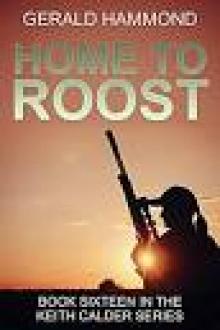 Home to Roost
Home to Roost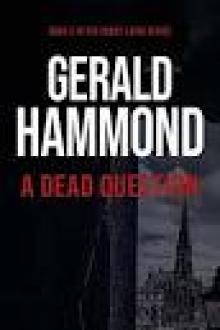 A Dead Question
A Dead Question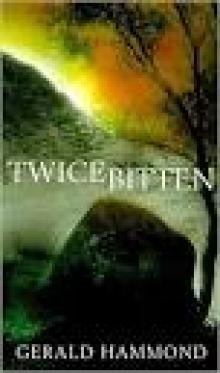 Twice Bitten
Twice Bitten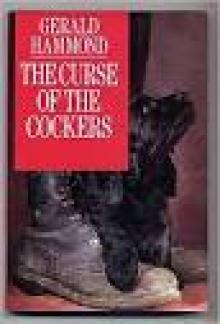 The Curse of the Cockers
The Curse of the Cockers In Loving Memory
In Loving Memory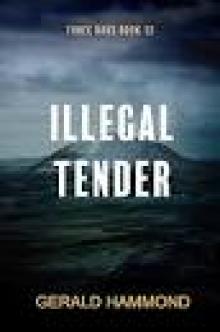 Illegal Tender (Three Oaks Book 12)
Illegal Tender (Three Oaks Book 12) Cold Relations (Honey Laird Book 1)
Cold Relations (Honey Laird Book 1)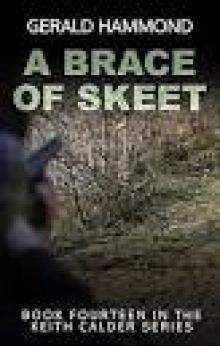 A Brace of Skeet
A Brace of Skeet Silver City Scandal
Silver City Scandal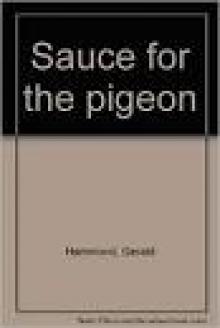 Sauce For the Pigeon
Sauce For the Pigeon Cold Relations
Cold Relations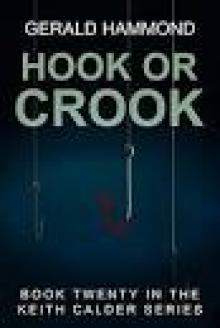 Hook or Crook
Hook or Crook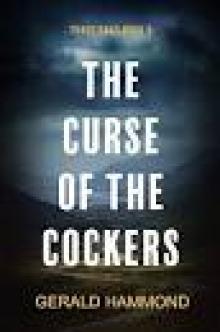 The Curse of the Cockers (Three Oaks Book 5)
The Curse of the Cockers (Three Oaks Book 5)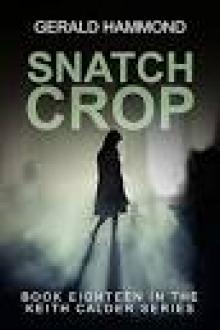 Snatch Crop
Snatch Crop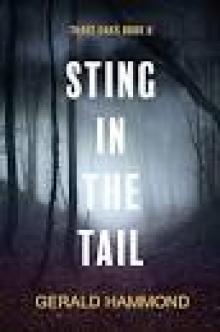 Sting in the Tail (Three Oaks Book 6)
Sting in the Tail (Three Oaks Book 6)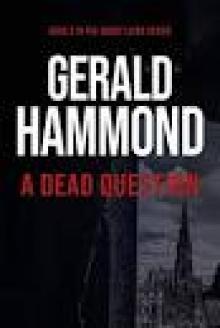 A Dead Question (Honey Laird Book 2)
A Dead Question (Honey Laird Book 2)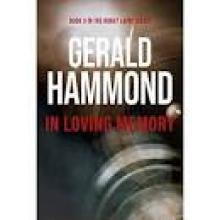 In Loving Memory (Honey Laird Book 3)
In Loving Memory (Honey Laird Book 3) Thin Air
Thin Air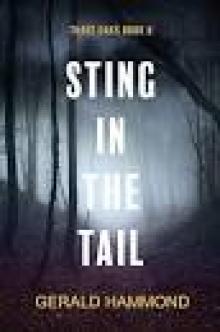 Sting in the Tail
Sting in the Tail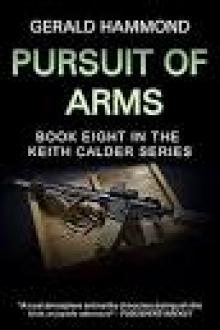 Pursuit of Arms
Pursuit of Arms The Game
The Game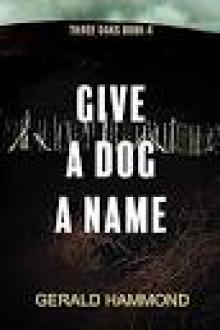 Give a Dog a Name (Three Oaks Book 4)
Give a Dog a Name (Three Oaks Book 4) Fair Game
Fair Game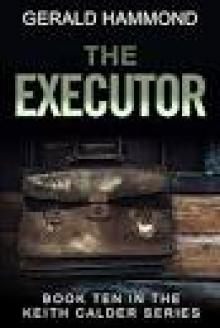 The Executor (Keith Calder Book 10)
The Executor (Keith Calder Book 10)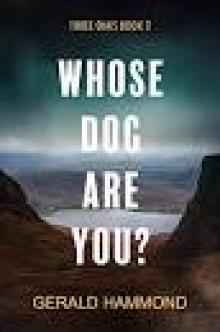 Whose Dog Are You? (Three Oaks Book 2)
Whose Dog Are You? (Three Oaks Book 2)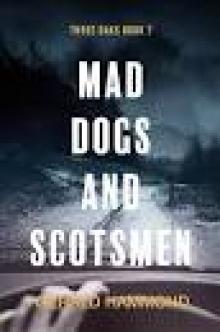 Mad Dogs and Scotsmen (Three Oaks Book 7)
Mad Dogs and Scotsmen (Three Oaks Book 7) Cousin Once Removed
Cousin Once Removed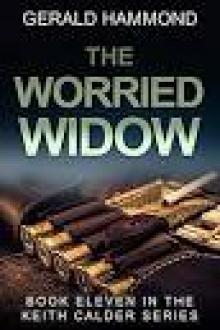 The Worried Widow
The Worried Widow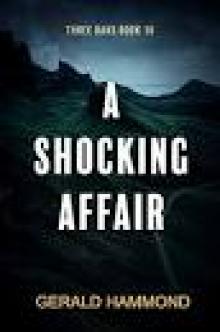 A Shocking Affair
A Shocking Affair Dead Weight (Three Oaks Book 11)
Dead Weight (Three Oaks Book 11)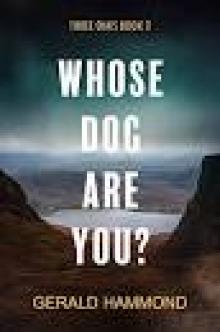 Whose Dog Are You
Whose Dog Are You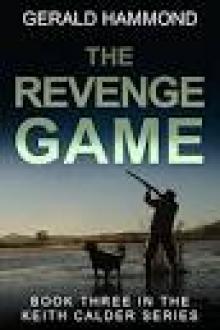 The Revenge Game
The Revenge Game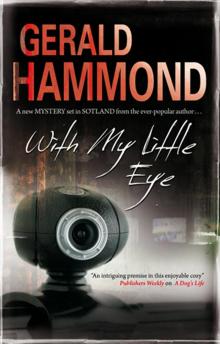 With My Little Eye
With My Little Eye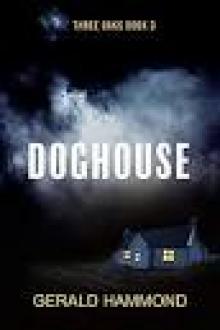 Doghouse (Three Oaks Book 3)
Doghouse (Three Oaks Book 3)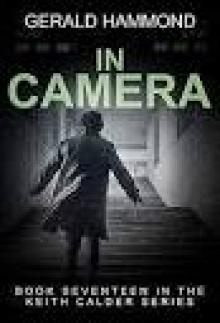 In Camera
In Camera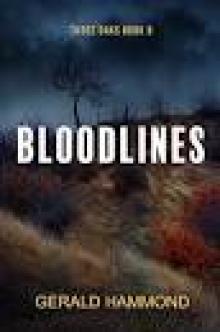 Bloodlines (Three Oaks Book 8)
Bloodlines (Three Oaks Book 8)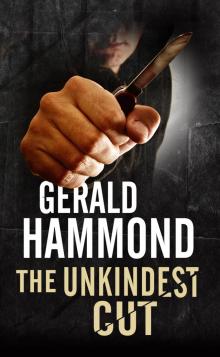 The Unkindest Cut
The Unkindest Cut